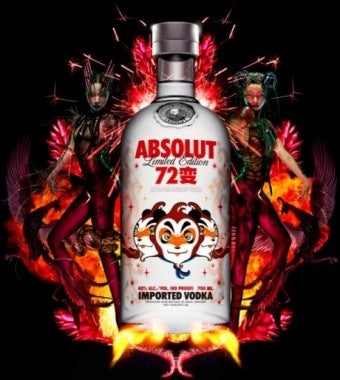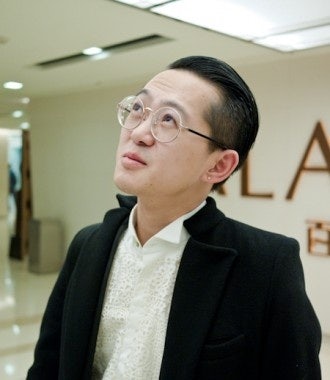Will Absolut's "Creativity" Campaign Work In China?#

Absolute 72变, designed by Gao Yu (Image courtesy Absolut)
The world's third-largest spirits brand, Swedish vodka maker Absolut has spent years cultivating a creative image in mature markets like Europe and North America. But in China, which, owing to its massive population and fast-growing economy, has become one of the world's top wine and spirits markets, Absolut is essentially starting from scratch. Though vodka (mostly Russian) has had a presence in China for decades, many of China's baijiu-inclined drinkers have been known to confuse vodka and other imported spirits like whiskey or gin. Recently, the Chinese periodical V Marketing China took a look at Absolut's efforts to fuse its brand with creativity in the minds of Chinese consumers, and asks if these strategies will pay off.
Though Absolut has featured a number of artist collaborations over the years, with the likes of Andy Warhol, Keith Haring and Helmut Newton among dozens of others, last summer's partnership with Gao Yu for the limited-edition, China-only "72 Transformations" bottle was its first featuring the work of a Chinese artist. Produced in a run of only 350,000 bottles, as Jing Daily pointed out last year, Gao's collaboration with Absolut marked a compelling overture to a market to which Absolut is a relative newcomer.
According to Richard Cotton, Absolut business director, the company's marketing goal in the China market is to "being the most creative brand." Recently Cotton broke down Absolut's business strategies, and shared how the brand's business culture could better cater to the Chinese market, in an interview with V Marketing China (translation by Jing Daily team):
We're trying to position Absolut as the most creative brand in China, and we're confident we can do it. First of all, Absolut vodka focuses on a small and non-mainstream demographic. In China, our consumer base is typically younger and lives outside of the mainstream. Their choice of drink, fashion, music and art is distinct from the majority. As strong proponents of new media and new art, China's younger generation, which has grown up in a climate of wealth accumulation, is more aware of foreign spirits than the average Chinese consumer.
Second, with the spread of new communications technologies, we've seen several sub-communities sprout up in China. We've noticed that more young people in China are interested in the concept of creativity, especially in terms of their online activities. Take [the Chinese social network] Douban for example. On Douban, netizens get together to create music and art, exchange ideas and express themselves creatively.
Finally, as the purchasing power of the Chinese increases, more consumers are starting to pay attention to luxury goods and artwork. As they've started to more seriously appreciate art, their tastes have become more sophisticated. This presents Absolut with an opportunity to integrate more fashion and artistic elements into our products and marketing campaigns in China, much as we have in the European and US markets.

Chinese artist Gao Yu (Image: Stylites in Beijing)
If Absolut's goal in China truly is to infiltrate a younger, more creative crowd, its partnership with Gao Yu and photographer Chen Man on last year's "Monkey King" bottle and related photo campaign was a good first step. Revisiting the Chen/Gao collaboration, this month Absolut is presenting a collection of images from the campaign at Beijing's Today Art Museum (running from May 11-22) and Shanghai's Long Man Art Projects from July 14-30.
The key here is that Absolut has obviously taken a notice of the budding interest in local culture and the arts that's appeared in China's larger cities in the past few years. As this increases among urban young people in the next several years and gradually pushes the more dominant South Korean and Japanese youth cultures aside, Absolut might look like visionary than most of its competitors. However, it pays to keep in mind that on the whole, China's young drinkers are far less regular customers than Absolut's target demographics in Europe or North America, so the payoff from the brand's efforts may take longer to become apparent.
By tapping Chinese social media platforms like Douban -- which it used to launch a poster design competition last year for the "72 Transformations" bottle, attracting over 8,000 "fans" and receiving 377 submissions -- as well as Kaixin and Sina Weibo, Absolut is trying to cultivate a brand image of being not only creative but also "plugged in" to youth culture. Whether it'll work, and we'll start to see more young urbanites in China reaching for Absolut in a crowded market in which every spirits brand is courting the Chinese, will remain to be seen.